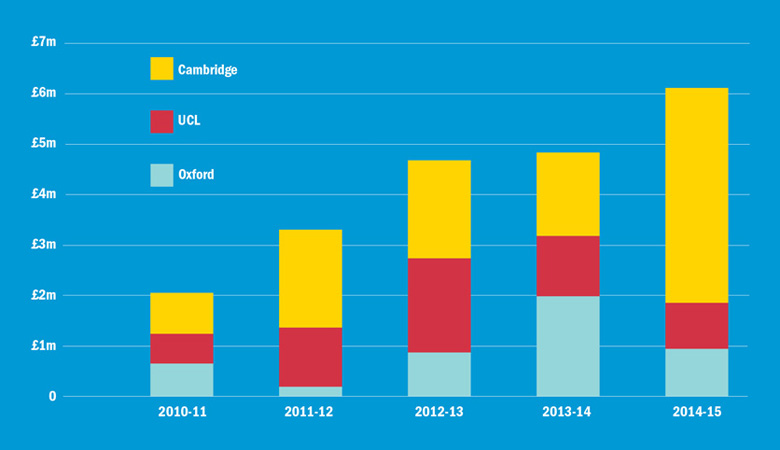Spiralling house prices in Oxford, Cambridge and London mean that universities are spending tens of millions of pounds to help academics buy homes, Times Higher Education has discovered.
A total of £21 million has been invested in loan programmes and joint equity schemes by the universities of Oxford, Cambridge and University College London over the past five years, according to data obtained by THE using Freedom of Information requests.
But there are warnings that such assistance risks inflating local house prices, could be unfair to professional and support staff unable to use the schemes, and fail to solve the underlying problem of unaffordable housing.
Cambridge was the biggest spender over the past five years. It offers a shared equity scheme to professors, readers, lecturers and “academic related and assistant staff” above a certain grade.
The university puts in a maximum of £500,000 and academics have to pay interest of 2 per cent on Cambridge’s investment.
Meanwhile, UCL offers loans of up to one year’s salary to newly appointed academic staff from lecturer upwards, and senior administrative staff.
Oxford gives housing loans to professors, but according to William James, pro-vice-chancellor (planning and resources), it would be switching to a Cambridge-style joint equity scheme that would continue to be largely targeted at professors. Most individual colleges also offered some kind of loan or joint equity scheme, he said.
Danny Dorling, Halford Mackinder professor of geography at Oxford and writer on unaffordable housing in the UK, said that such schemes had serious drawbacks.
“The problem is that it increases the inflation in the local housing market. It makes the problem worse,” he said.
He argued that for universities investing in the housing market, “it could be quite a foolish thing to do. We’re in a housing bubble, we don’t know when there will be a crash.”
Amount spent over past five years on loans and joint equity schemes for staff housing

It could also be “divisive” if schemes were open to one type of staff but not another. “Universities have many, many staff, not just academics,” he said.
More generally, helping academics to get on the housing ladder would not isolate universities from the broader impacts of the housing crisis, Professor Dorling said. “You need to be in a functioning city”, which requires affordable housing, he argued.
Professor James said that the fundamental problem was the “overheated property market” in Oxford and he supported the lifting of green belt restrictions “in a selective way” to allow the city to expand.
Because new homes in Oxford were liable to be “snapped up” by London commuters, the university was looking at developing affordable rental accommodation for its staff, particularly postdocs who often had to rent expensive and poor quality properties, he said.
Cambridge has already pursued this kind of solution – its new North West Cambridge Development is set to house 1,500 university and related organisation staff if they cannot afford market rents.
Asked whether it was fair to target housing assistance at professors, Professor James said: “we can only justify it to discharge our charitable mission” to educate, and insisted that “it’s not making the assumption that other staff aren’t important”.
A spokesman for Cambridge said that it was “committed to attracting and retaining the best students and staff from all over the world. We are therefore working with local partners to tackle this issue [of high demand for housing].”
“The shared equity scheme forms part of this work, alongside building new and affordable houses which is vital to the economic health of the region,” he said.
A UCL spokesman said its spending was likely to fluctuate "quite a bit", as shown by the figures, and would not necessarily keep going up every year. "Generally, we’d expect to spend more in the lead-up to [research excellence framework] exercises for instance (as was the case in 2013)," he said.
He added that the number of UCL house loans was "very low" in the context of the London market and so "would have no significant impact on house prices overall" in the capital.
POSTSCRIPT:
Print headline: Millions spent helping scholars buy homes
Register to continue
Why register?
- Registration is free and only takes a moment
- Once registered, you can read 3 articles a month
- Sign up for our newsletter
Subscribe
Or subscribe for unlimited access to:
- Unlimited access to news, views, insights & reviews
- Digital editions
- Digital access to THE’s university and college rankings analysis
Already registered or a current subscriber?





